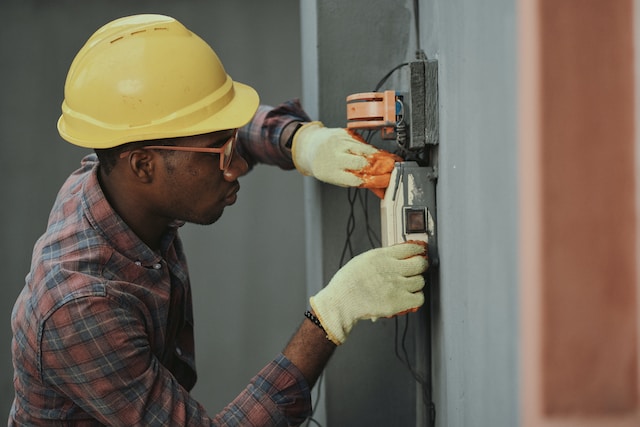What You Need to Know About Preventing Short Circuits
You’re home alone and suddenly, the lights flicker out. You’ve blown a fuse again, haven’t you? Short circuits are more than just a nuisance, they’re potential fire hazards.
Don’t worry, we’ve got your back. In this article, you’ll learn the common causes of short circuits, the dangers they pose, and practical steps you can take to prevent them.
Plus, we’ll tell you when it’s time to call in a professional electrician.
Stay safe and informed with us.
Understanding Short Circuits
To prevent your home’s electrical system from short circuiting, it’s crucial to first understand what a short circuit is. It’s a fault in your wiring where electricity strays off its intended path, leading to an uncontrolled flow of current. This causes excessive heat and potentially fire.
Circuit Analysis and Fault Diagnosis are two essential skills to detect and prevent short circuits. Circuit Analysis helps identify the paths electricity takes within your system. It’s how you’ll discover if current is taking unintended routes.
Fault Diagnosis, on the other hand, is about pinpointing where the actual problem lies. It’s finding that faulty wire or component causing the disruption.
Common Causes of Short Circuits
In dealing with short circuits, it’s crucial for you to recognize the common causes, which can range from faulty wiring to overloaded circuits. Your first step should be a faulty wiring analysis. This involves inspecting your electrical system for any signs of wear and tear, damages, or improper installation. Faulty wiring is a major cause of short circuits, often leading to overheating and sparking.

Another common cause is insulation breakdown. This can happen due to age, exposure to heat, or physical damage. When insulation breaks down, it can’t keep electrical wires separated. This allows current to flow where it shouldn’t, causing a short circuit.
Understanding these causes gives you a fighting chance to prevent short circuits before they occur.
Dangers Associated With Short Circuits
When you’re dealing with short circuits, the threat isn’t just about disrupted power—it’s about the safety hazards such as fires, electrical shocks, and significant property damage that can occur. Fire hazards are a major concern, as a short circuit can cause sparks which may ignite nearby flammable materials. Electrical shocks can result in serious injury or even death.
Furthermore, the potential property damage isn’t simply a matter of replacing a few burnt wires. The insurance implications of a short circuit can be significant. Your policy may not cover damage caused by electrical faults if you’ve ignored clear signs of a problem. So, it’s crucial you take short circuit prevention seriously to ensure your safety and protect your property.
Practical Steps to Prevent Short Circuits
While you might feel overwhelmed by the potential dangers of short circuits, there are practical steps you can take to prevent them from occurring in your home or workplace.
Regular circuit breaker maintenance is key. Make sure to replace old or damaged breakers, as they’re prone to cause short circuits.
It’s also important to periodically check your wiring insulation. If it’s worn or frayed, you’re at risk. Considering hiring a professional to inspect your electrical system if you’re unsure. They can identify and fix potential problems before they become serious.

When to Consult a Professional Electrician
Despite your best efforts to prevent short circuits, you’ll need to call in a professional electrician under certain circumstances. If you’re dealing with frequent power outages, flickering lights, or burnt fuses, it’s time to call a pro. It’s not just about solving the problem, but also ensuring your safety.
Now, when choosing an electrician, qualifications matter. Check their licensing, training, and experience. Don’t be shy to ask for references. You want someone who knows their stuff and can fix your problem the first time around.
Cost considerations also come into play. While it’s tempting to go for the cheapest option, remember that you usually get what you pay for. So, balance cost with quality. In the end, you’ll save more by preventing further electrical damage.
Frequently Asked Questions
What Are the Costs Associated With Fixing a Short Circuit?
Fixing a short circuit can be pricey. Costs depend on your insurance coverage and the circuit breaker type. You’ll likely pay for a professional electrician’s labor and possibly for replacement parts or upgrades.
Are There Any Specific Tools Required for Preventing Short Circuits?
Yes, you’ll need specific tools. Circuit breakers usage is key in preventing short circuits. Also, understanding insulation importance is crucial. Both help maintain electrical flow and prevent potential damage to your circuits.
Can Weather Conditions Influence the Occurrence of Short Circuits?

Yes, weather conditions can indeed influence short circuits. It’s crucial to take weatherproofing measures to mitigate the climate impact. By doing so, you’re safeguarding your electrical systems against unfavorable weather conditions.
How Does Short Circuit Prevention Differ for Different Types of Electrical Appliances?
Preventing short circuits in various appliances involves understanding appliance safety measures and circuit design variations. Each appliance has unique needs, so you’ll need to apply specific strategies to protect against potential electrical mishaps.
Can Short Circuits Have a Long-Term Impact on the Overall Electrical System of a Property?
Yes, short circuits can indeed impact your property’s electrical system. They increase system vulnerability, potentially damaging components and reducing circuit lifespan. It’s crucial to address these issues promptly to prevent larger problems.
Conclusion
So, you’ve got the lowdown on short circuits – their causes, risks, and prevention.
But remember, prevention is always better than cure. Keep your wiring in check, don’t overload circuits, and ensure all electrical installations are done correctly.
If you’re unsure or find yourself in hot water, don’t hesitate to call a professional electrician. After all, it’s better to be safe than sorry when dealing with electricity.
